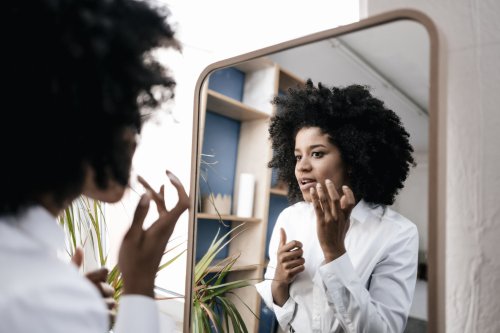I have the steps to my skin-care routine down pat: I double cleanse, use a toner, add serum, and top it all off with a moisturizer. The consistency usually keeps my skin pretty happy, so when zits started popping up—first a few rogue pimples, which turned into several angry clusters—I entered crisis mode.
To handle the situation, I did what any beauty editor would do and dialed up a facialist, stat. After going over my current skin-care regimen, Angelina Umansky of Spa Radiance (AKA my crisis center help line representative) noticed a glaring red flag: vitamin E. “It can clog pores because it has a thick, oily-jelly feeling to it, which can make some people breakout,” she says.
This was something I’d never heard before—but, as it turns out, vitamin E, which is actually really common in skin-care products isn’t suitable for every skin type. “Vitamin E is a potent antioxidant that’s commonly paired with others like vitamin C and ferulic acid,” says Joshua Zeichner, MD, a New York-based dermatologist. “As such, it can help brighten the complexion, minimize free radical damage caused by UV light, and support healthy collagen production.”
This Parisian Skincare Brand Is Launching in the United States for the First Time—Here’s What a Derm Wants You to Know

We’re Calling It: Cleansing Balms Are the Face Wash of the Future—Here Are 3 to Add to Your Cart

This Is the One Product That Scarlett Johansson Always Keeps in Her Purse and on Her Bedside Table

The thing is, he doesn’t recommend it on people with oily or acne-prone skin. “That’s because it’s lipophilic, or an oil-soluble vitamin,” notes Dr. Zeichner. “So it can clog your pores—instead, stick with vitamin C, which is a water-based vitamin. I typically recommend vitamin E for patients with normal, dry, or aging skin.”
There’s also the issue that, in order to save money or streamline the manufacturing process, some brands can dilute the vitamin in its pure form—which makes it worse for your complexion. “Some companies cut steps and use more processed vitamin E,” says Umansky. The more processed, the more acne-inducing it can be.
Dr. Zeichner notes that similar sleeper ingredients acne-prone and oily skin-care types should avoid include heavy oils like avocado and olive. “They contain high levels of vitamin E,” he says. Moral of the story: Know your skin type before reaching for all letters of the alphabet in your topical vitamins.
Here’s how to figure out your skin type, plus how to read your face to determine the root cause of a breakout.
Sign Up for Our Daily Newsletter
Get all the latest in wellness, trends, food, fitness, beauty, and more delivered right to your inbox.
Got it, you've been added to our email list.








